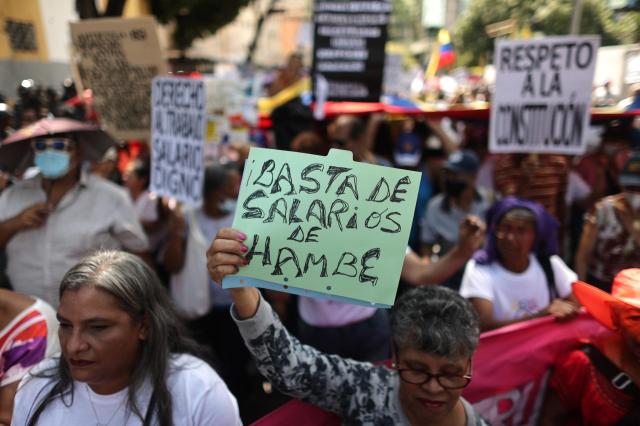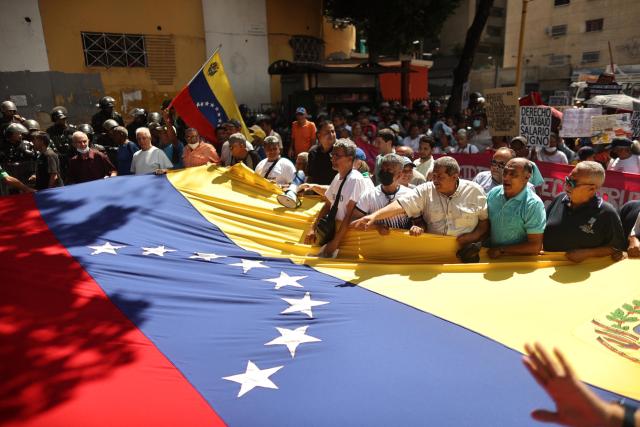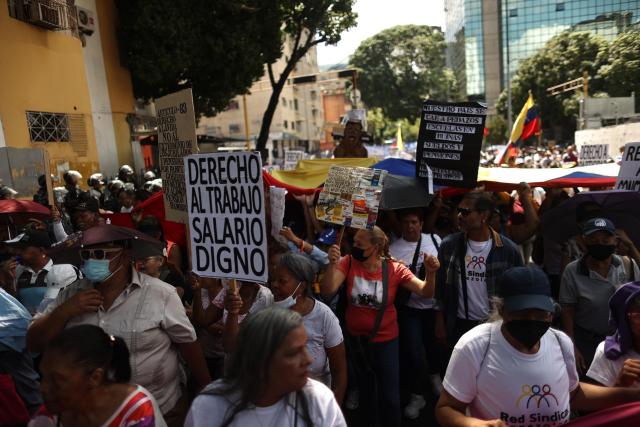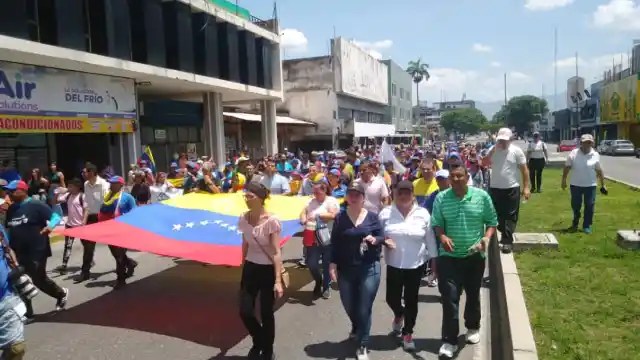
During the morning of this Monday, May 1st, workers from all over the country responded to the call of trade unions to take to the streets and demand not only better wages for active and retired workers, but also better working conditions from Nicolás Maduro’s regime.
lapatilla.com
In the city of Caracas, the mobilization of unions was carried out from the “Credicard” tower located in Chacaíto to its final destination, the headquarters of the Public Ministry in Parque Carabobo, to deliver a document to the Attorney General of the Republic.
However, the workers who joined this peaceful protest denounced that the demonstration could not complete its route after officials of the Bolivarian National Police (PNB) restricted the passage.
The demonstrators were prevented from passing by anti-riot trucks close the Hotel Alba Caracas on Avenida México.
One of the union leaders participating in the demonstration pointed out that the repressive action showed “lack of respect”, alleging that the permit should have enabled the march to reach the Public Ministry.
“It is disrespectful, they cannot say how far the march will go (…) we are going to press because we ask for permission to go to Parque Carabobo,” he denounced.
In the midst of the day of mobilizations this Monday, May 1st, Nicolás Maduro, head of Chavismo, announced the increase in the benefit of “cestatickets” (food bonus payment) to 40 dollars a month, likewise, he increased the “Economic Warfare Bonus” to 20 U.S. dollars.
NOT EVEN THE AGGRESSIONS STOPPED THE FIGHT OF THE TRADE UNIONS

Just as the repressive forces of Chavismo tried to repress the workers’ demonstration in Caracas, teachers who were demanding their salary rights in Guárico confronted one of the state’s police security chains and denounced that they were allegedly attacked.
“We already had permission to come out and today the (National) Guard and the Police blocked our way. These officials attacked a group of women that were here, and one of the officers grabbed and pulled my hair,” denounced Emilaynis Tabares, an educator present at the scene.
Similarly, unions in Falcón left their fear at home and took to the streets despite the strong police presence and riot squads.
Given the situation, Franklin Medina, representative of the “Intergremial Paraguaná” (trade union federation), said that teachers are not a danger, likewise, he reaffirmed that they are demanding dignified working conditions.
“We are not a danger to the nation, but we do represent the last remaining bastion of struggle in Venezuela and we will continue to be so. It is not possible that today 412 days have passed since the last salary increase and inflation is over 500%. Until now, the National Government has not shown its face to the workers and here are the workers demanding their right and we will continue until we achieve our objectives,” he said.
In Cumaná, public employees were not intimidated by the presence of the police and marched for job improvements.
From fishermen, nurses, doctors, teachers and other employees gathered in the streets of the Sucre State capital. In addition, there was evidence of a strong deployment of security corps.
WORKERS WITHOUT MUCH TO CELEBRATE

With a massive march that started from the “Plaza Los Ilustres” in Barquisimeto, workers from the different trades of the city came together to commemorate this important date.
The activity was supported by the different trades and unions of Lara State’s capital, and will remain in the fight for a better salaries and labor conditions.
Under the motto “it’s not because of the blockade, it’s because of the looting” and “I don’t want to leave, I want a decent salary to stay in my country”, the working masses of Lara State toured the streets of Barquisimeto, until they reached the headquarters of the Lara Educational Zone, the epicenter of the protests that educators launched since January 9th of this year.
Similarly, in Monagas, Apure and Valencia, unions came together to demand respect for their labor and citizen rights.
In Aragua, workers warned that they will continue on the streets until they gain the wage demands.
In Mérida, the workers denounced that: “the monthly salary is not enough for neither a kilogram of flour or cheese,” stated a mother of a family that she must moonlight to bring daily bread to her children.

In addition, doctors denounced the precarious situation they are going through in Merida hospitals, the lack of supplies and very poor salary conditions. “We work by vocation, not for a salary.”
Also joining the protest were education professionals from the Universidad de Los Andes, the Kléber Ramírez Polytechnic University and education teachers’ unions.
Teachers, doctors and merchants from Tachira protested at the border
Education, health and business professionals marched through the streets of San Antonio del Táchira to remind Nicolás Maduro’s regime that the salary they receive is not enough for them to survive.
“The dollar rises and hunger grows,” said one of the large banners that the teachers displayed along the streets of this border town.
On behalf of the commerce and tourism sector, Anggie Nieto, pointed out that they joined the educators to demand decent wages, and in turn took the opportunity to mention that the commercial sector of San Antonio is being hit hard with high rates for water and electricity services, which are not adjusted to the economic reality of the area or the country.

